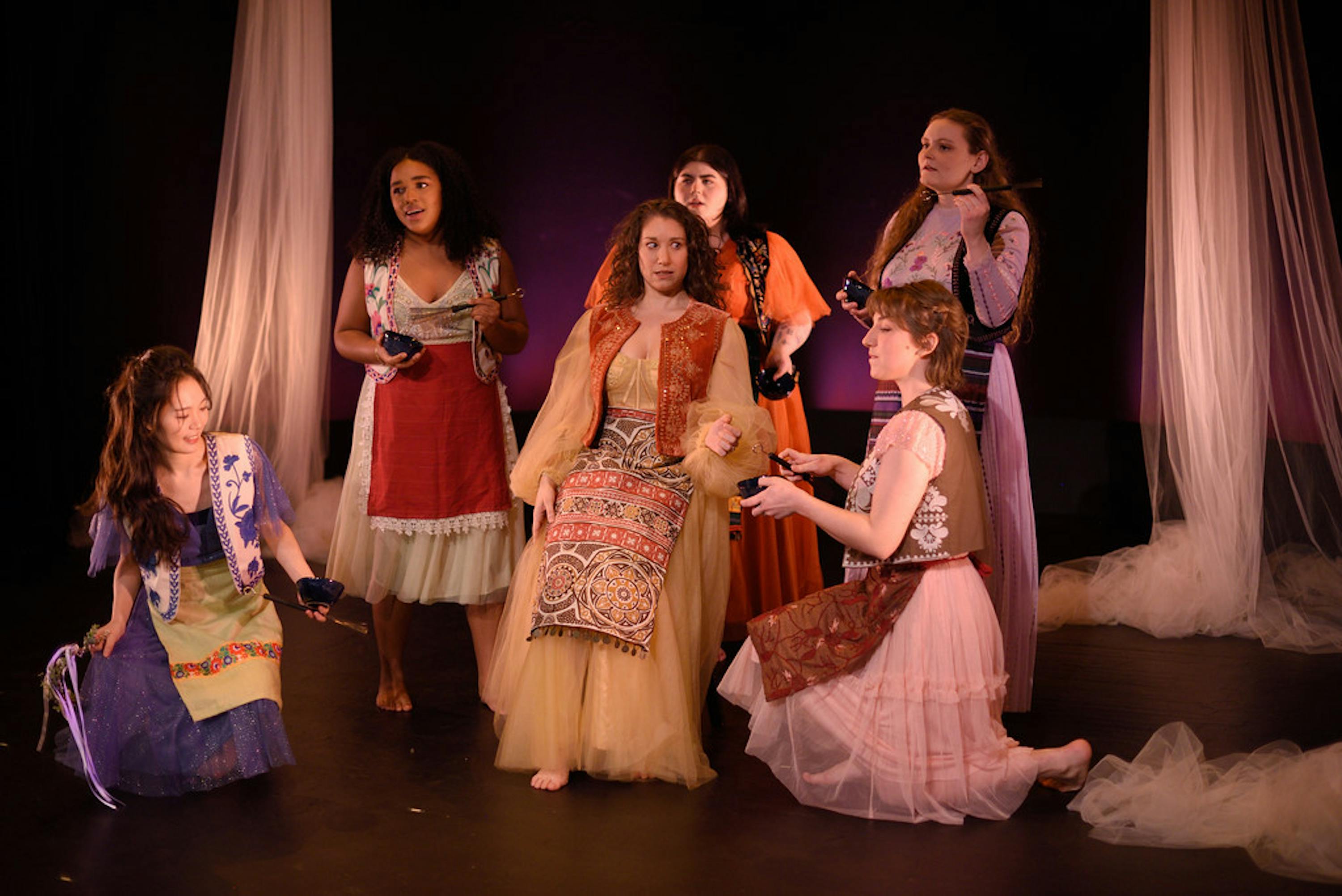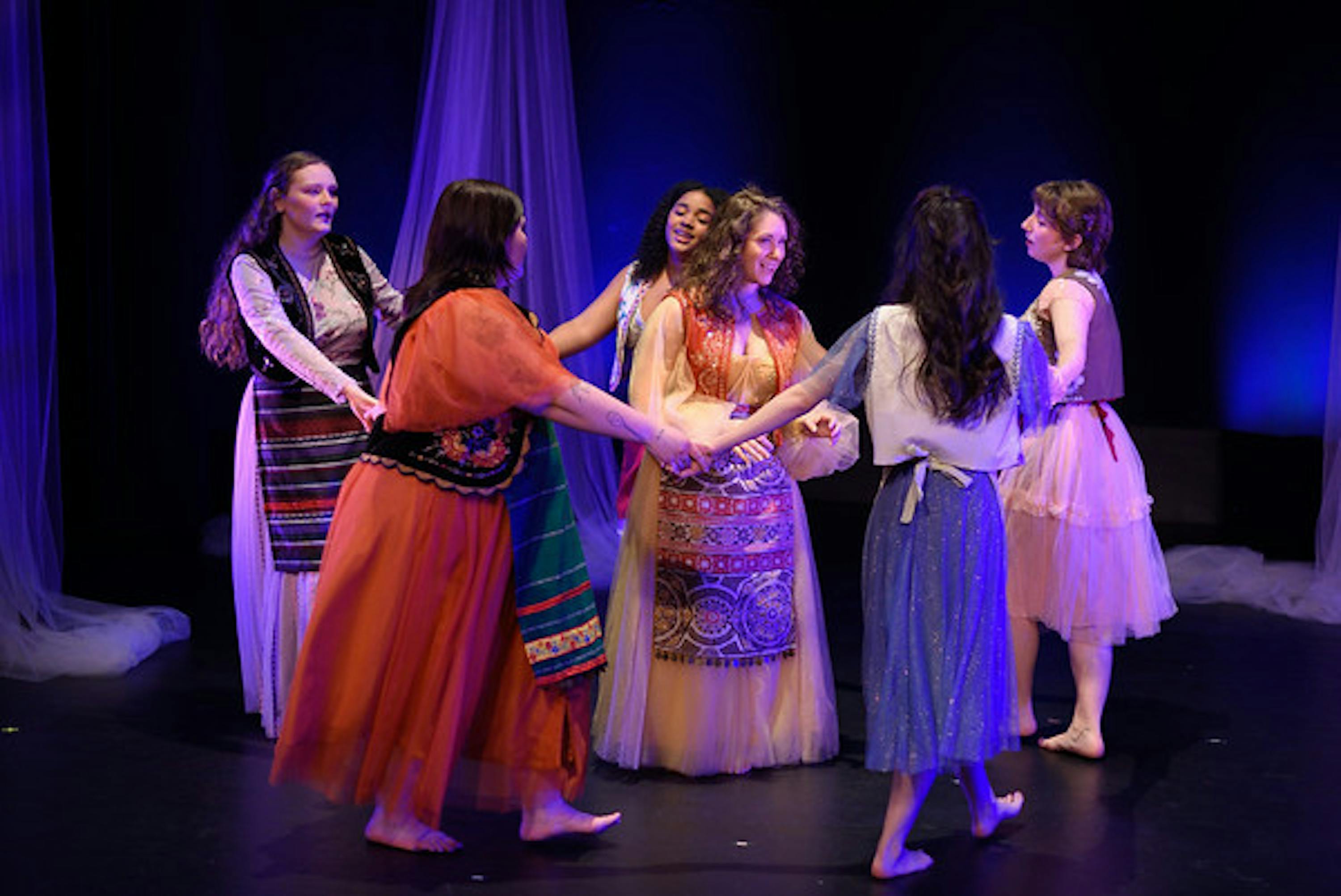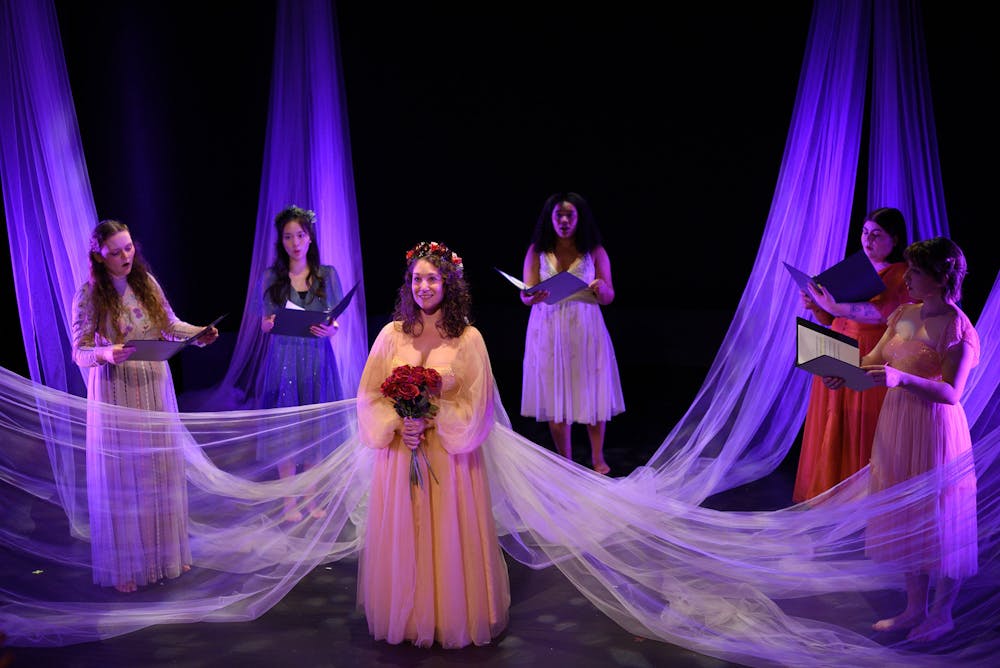If you’re like me, you’re getting to the age where, just every once in a while, someone you knew from school gets married. Just this morning, I saw a post from a girl I was close friends with back in elementary school celebrating her marriage. I was shocked. In my memory she’s still a child, just a little girl with pigtails and glasses, and now she’s starting a whole new phase of her life. This terrifying and exciting transition from girlhood to womanhood, and the role of marriage as the boundary between the two, is explored in Ana Sokolović’s contemporary opera Svadba.
Svadba was performed by the Peabody Chamber Opera at Theatre Project on the weekend of Feb. 16–Feb. 18. The opera is Serbian, and in Serbian, Svadba translates to “marriage.” The story follows a bride-to-be, Milica (played by Celine Mogielnicki in the performance I saw), and her five bridesmaids on the night before the wedding.
The opera was strange and surreal. The story is told in a non-linear way, a collection of vignettes of the six women excitedly getting ready for the wedding. At times it felt like I was being enchanted by a group of mystical witches. At other times, it felt like I was just watching a group of young women giddily spending a night hanging out, chatting and getting ready for a big celebration. I felt drunk on the music, ungrounded from reality and utterly captivated.
This opera is sung a cappella, meaning largely without an orchestra or other backing instruments. But there are actually very few intelligible words and sentences in the opera at all. Much of what is sung by the singers are simple sentences that overlap each other or are sung in rounds, with the words themselves unintelligible. Each word, each fragment of language, is instead enlivened by its sound rather than its literal meaning. For example, at one point, all the performers sang a whole section of a song with just the words “zigga zigga,” which created an interesting sonic texture.
The music itself was dissonant and beautiful. It was difficult to pick out different melodies (this is definitely not the kind of opera where tunes get stuck in your head), but the textures and interestingly dissonant chords were entrancing. There were moments where the singers sounded like slide whistles or ambulance sirens, others where they sang while blowing raspberries. At one point, the bride and her oldest friend (McKey Monroe) were almost hissing at each other during an argument.
They also incorporated percussive elements into the mix at times. They stamped their feet, banged metal utensils against bowls, tipped rainsticks and blew on small ocarina-like instruments. All of these different elements made it unlike any musical performance I’d ever seen before.

COURTESY OF EDWARD S. DAVIS
This production of Svadba incorporated many unusual sounds into its sonic landscape, including banging on bowls with metal tools.
In an interview with The News-Letter, graduate student Eden Bartholomew, who played Danica the maid of honor, spoke about the unique challenges that came with the nonsense words incorporated into the opera.
“I would say the most challenging part and the most fun was getting to make unconventional sounds and instill meaning into them,“ Bartholomew said. “And to get them to have subtext so that people will understand what we’re saying even if we’re not saying words.”
Over the course of the performance, we see moments where the women portray different stages of their lives. Their girlish selves were portrayed in moments where they played patty cake on stage, when they teased each other and bound around on the stage and when they held hands to dance in a circle. We also get glimpses of young adulthood, like seeing the girls going out and having an encounter with a group of men, but the majority of the focus is on those sweet girlhood years. And we see the beginnings of womanhood in moments where Milica is left alone in the middle of the stage, her bridesmaids’ backs turned from her, as she looks ahead to leaving her family and starting a new life.

COURTESY OF EDWARD S. DAVIS
The bridesmaids dancing in a circle around the bride was one of the ways the production weaved elements of girlhood into the pre-wedding ceremony.
On the website where the score can be purchased, Sokolović described the importance of weddings in her composer’s note.
“A wedding is an important turning point in every woman’s life, usually steeped in tradition and always signifying change and juncture. Milica’s rite of passage is universal, an archetype of human experience,” Sokolović wrote.
The opera characterizes marriage as a cause for mourning. The phrases “I am my mother’s only child” and “Our friend, you are leaving us” were sung several times during the opera in piercing, haunting tones. It’s the end of the carefree friendships of girlhood.
But marriage is also something to embrace. At the end of the opera, Mogielnicki gives a long and haunting aria as Milica. In it, her voice is stunningly powerful and strong. It filled the entire space of the theater with its rich sound. The piece was sung calmly and steadily, and yet, with an undercurrent of something that was wondering and mournful and hopeful all at once. And maybe that’s what marriage is.

COURTESY OF EDWARD S. DAVIS
Celine Mogielnicki delivered a stunning aria as Milica, signifying her transition into womanhood.
It goes without saying that the singing was excellent. This is the Peabody Institute after all. But throughout the whole opera, I was shocked at the sheer quantity of words and sounds the singers had needed to memorize. I never heard a single misplaced note. And while these singers were creating this mind-boggling music and quality of tone, they were also acting and hitting their marks in the choreography. The choreography was wonderfully dynamic as well, and the costume design was great.
I wonder though, in a world where people are waiting longer and longer to get married, is marriage still the same marker of transition to womanhood as it once was? Svadba originally came out in 2011, so it’s a fairly contemporary piece. Though the small traditions of the night before marriage — the late night conversations, excitedly getting ready, the feeling of nervousness — may never change, so much else about how we see marriage is changing. Maybe marriage is no longer the boundary between girlhood and womanhood as it used to be. However, it’s still a monumental transition in people’s lives.
Svadba is a surreal, beautiful opera about growing up and leaving the life you once knew. It was definitely strange (the friends I went with compared it to Midsommar except without the horror), but I loved it. Whether you get married right out of high school or are happy to stay single your whole life, I think that the themes and emotions will find a way to resonate with everyone.





